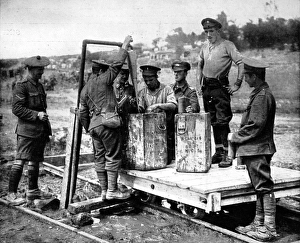Refilling Collection
During World War II, amidst the chaos and destruction, a sense of respite could be found in the act of refilling
All Professionally Made to Order for Quick Shipping
During World War II, amidst the chaos and destruction, a sense of respite could be found in the act of refilling. Whether it was refueling aircraft or replenishing water bottles, these moments provided a brief pause from the relentless turmoil. In the midst of a hurricane between flights, brave pilots worked tirelessly to ensure their planes were ready for battle. With every drop of fuel added to their tanks, they knew they were one step closer to victory. At tea warehouses scattered across London, workers meticulously refilled chests with fragrant leaves. The delicate engravings captured this laborious process as hands carefully measured and poured tea into each chest. These sketches immortalized the artistry behind this essential task. Soldiers on the front lines would often stop to refill their water bottles at designated locations. These fixed points became lifelines in arid landscapes where hydration meant survival. A momentary break from combat allowed them to quench their thirst and gather strength for what lay ahead. Advertisements for National Benzole petroleum showcased its importance in keeping vehicles running smoothly during wartime. Refilling engines with this vital resource ensured that transportation remained efficient even in challenging times. The bustling tea warehouses belonging to East & West India Dock Company played a crucial role in satisfying Britain's love affair with tea. After bulking large quantities of precious leaves, workers diligently refilled empty chests, ensuring that shelves across the nation would never run dry. Even beyond war zones and teahouses, refilling took many forms throughout history. In 1889 at a telegraph office battery room, technicians diligently replaced spent cells with fresh ones - an intricate dance performed daily to keep communication lines open. During rail strikes when tensions ran high between management and workers' unions, engine tenders needed constant replenishment amid dwindling resources. Refilling these tender cars became symbolic acts of defiance against adversity - keeping trains moving despite obstacles faced by both sides. Amidst all these diverse scenes, one constant remained - the resilience and determination of British soldiers.








